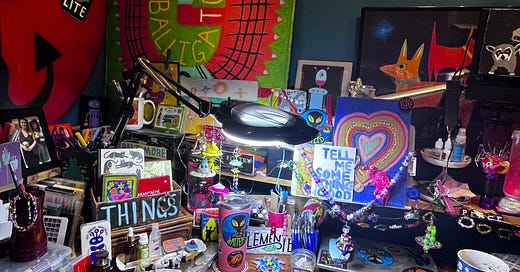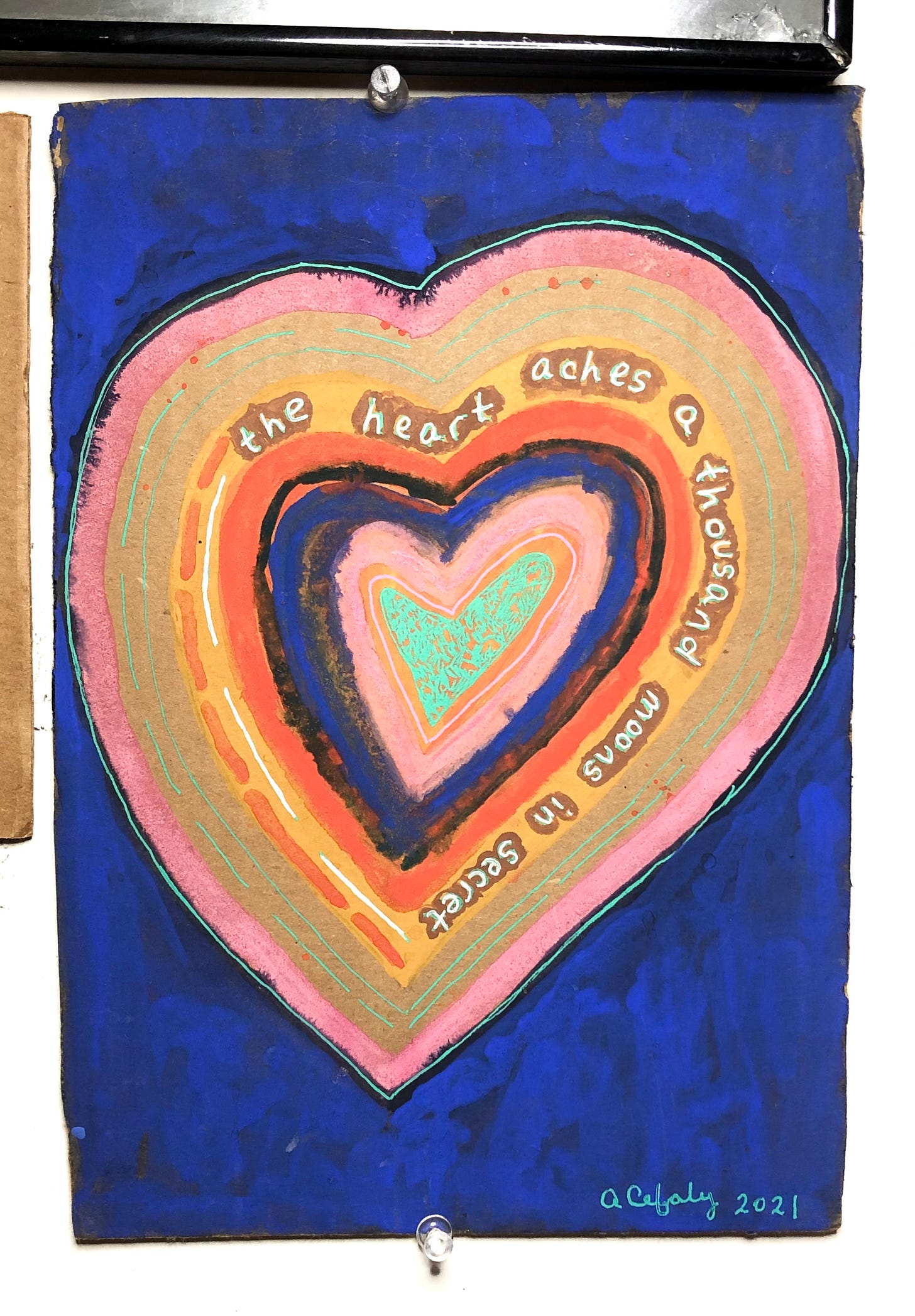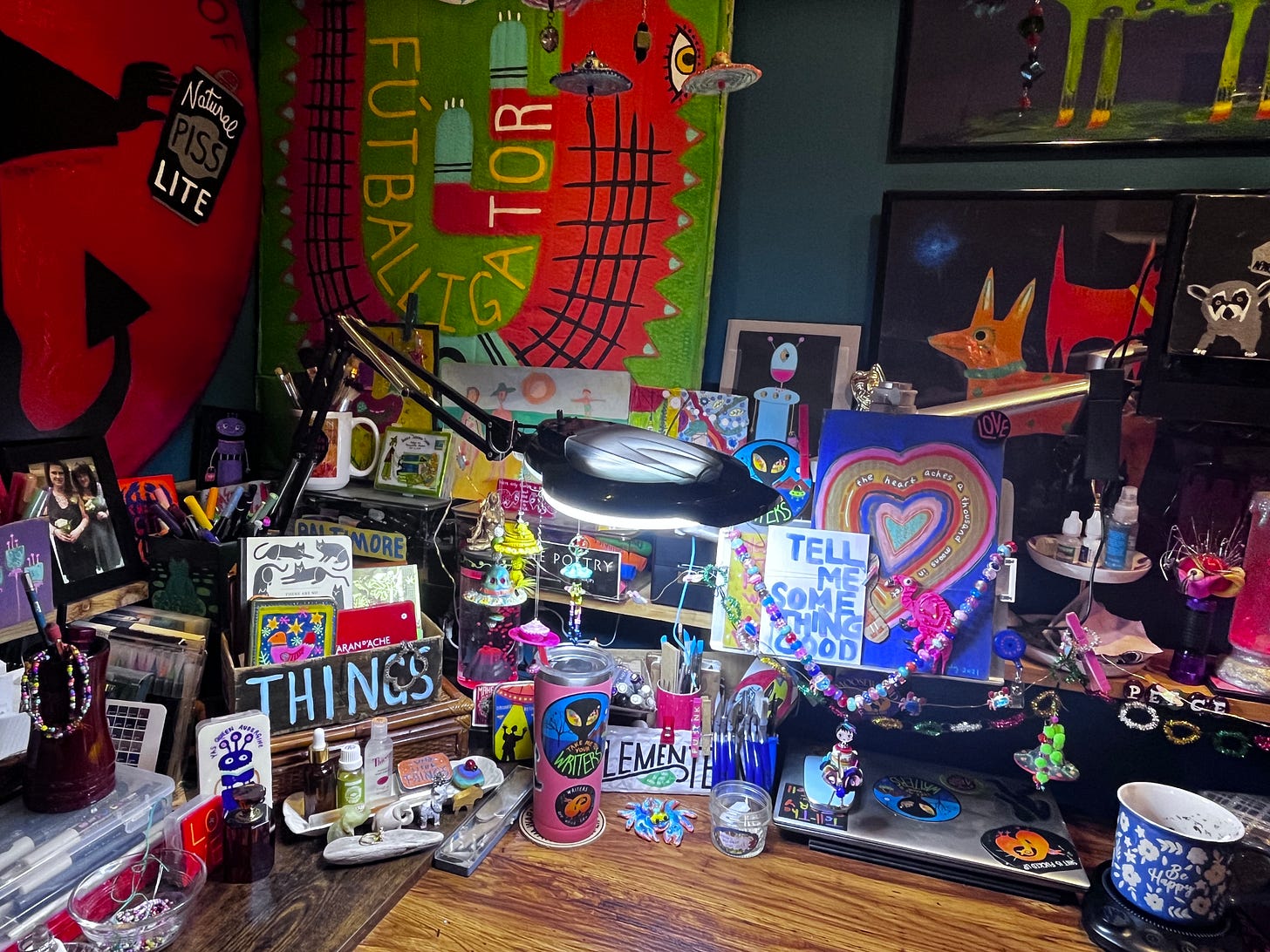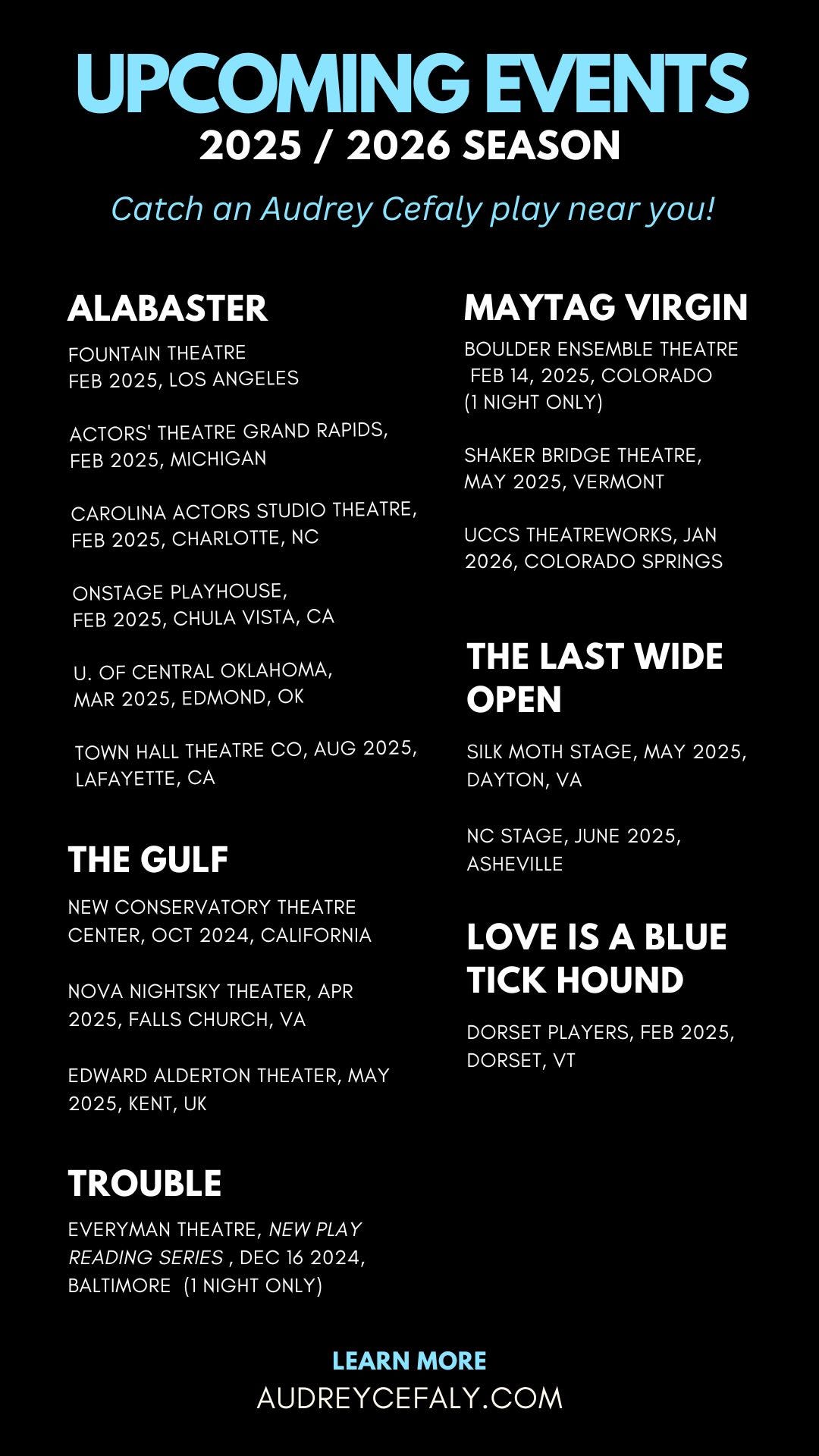Someone told my playwright colleague that playwriting is "the lazy way out of dealing with mental health." And that therapy was the "braver" choice. I've been sitting with this for a few days. Here we go.
It seems to me that the lazy way out of mental health is to do nothing at all. Playwriting is hard. Very, very hard. It's also a rather blind assertion, no? That playwriting is a purely selfish act? On its face, is not the altruistic nature of sharing and giving an intrinsic part of mental health?
I've gained from therapy, sure. But it's not an either/or. The playwriting has brought me closer to not only my own personal truths but to life's universal truths.
I painted this cardboard heart during the pandemic. It sits above my desk to remind me of all the nights I've cried myself to sleep, shuttered and alone. And of why the conversation of shared suffering is so necessary. Stories of light and revelation have the ability to ease the suffering of the world. And for many, theatergoing IS their therapy.
In terms of which is braver... playwriting or traditional therapy—to each their own mileage. But it is no great secret, especially for those in the trenches, that playwriting is not so romantic at all. It is—oftentimes—a most UNDIGNIFIED profession.
In playwriting, we expose ourselves; we lay bare the best and the worst of us; we encode our deepest fears, our wounds on full display... and then, through the miracle of collaboration, we start conversations with total strangers... in the dark.
In playwriting, we encapsulate "all that we think we know" about a thing into a living, breathing thesis. We gut ourselves for the art; we give it all away. And then we sit back, we listen, and we wait... for signals in the void. And you want to sit there and tell me that's not brave?!
And then... there are the bad days. Because sometimes, for many of us, the signal never comes. These are the darkest days. Grief ritual. These periods require us to examine what we're really made of. What our identity is without this "thing." We take inventory. We regroup; we try and try again and again...
So, when the dark days come, and they do, and I'm lost and alone and crying in yet another sad, sterile hotel room... or sitting at some retreat with no ability to form a cogent thought... I am forced to sit with myself. And think about why I keep putting myself through this.
There are scouts in the void... looking for any clue, any power-ups, any relief from the never-ending savage blows of life. Few professions are this close to the bone. Few professions position us so close to the barricade.
Playwriting taught me to playwright on purpose. I have to get up, put myself together, push all the negative stuff down, and paint on a smile, and then I have to leave the comfort and safety of my home. Be with other people. Examine my life. Think deeply about things—even when I haven't the slightest of clues. Find the words for those deep thoughts. Write the words down. Edit them a million times over. And then explain them to a bunch of people. And that's on top of writing a 3-sentence synopsis of a play I do not yet understand and may never understand, which is the ABSOLUTE WORST task of playwriting.
Don't talk to me about lazy.
PREVIOUS ARTICLES BY AUDREY CEFALY
52 Vocabulary Words for Playwrights
A collection of weird and unusual words for the things we do as playwrights.10 Things Playwrights Wish Their Actors Understood
A love letterTo Speak or Not to Speak?
4 Ways to Create Indelible Non-Speaking Roles for the Stage21 Things I Know About Playwriting
I wrote my first play twenty years ago. I wrote my second play one year later. Here are 21 things I learned in the year between the two.
LEAN MORE ABOUT AUDREY
Visit my website for more about me and the work I do!
QUICK LINKS TO MY PLAYS
Audrey Cefaly's plays (Alabaster, Maytag Virgin, The Gulf, The Last Wide Open, Trouble) have garnered the Lammy Award, the Calicchio Prize, the NNPN Goldman Prize, the Edgerton, and a Pulitzer nomination. Her works have been produced at Signature Theatre, Cincinnati Playhouse, Barter Theatre, Merrimack Rep, Florida Studio, Florida Rep, Gulfshore Playhouse, and countless others. Cefaly is a Dramatist Guild Foundation "Traveling Master," an Arena Stage playwright cohort, and a recipient of the Walter E. Dakin Fellowship from the Sewanee Writers Conference. She is published by Concord Theatricals, Applause Books, Smith & Kraus and TRW.
Thanks for reading How To Playwright!
Subscribe for free to receive new posts and support my work.








i've only read the first paragraph so far, but I needed to comment. The first time I went therapist shopping, one of the psychologists I spoke to referred to my playwriting as "sublimating." I did not see that therapist ever again. I have no regrets.
The therapist I ended up with, and have been with off and on for 25 years, actually comes to my fuckin' shows. The art always gives him insight.
I have written a musical about Epilepsy. Lazy? Are they nuts. Trying to make people aware vs just sitting in a room with one other person seems like the lazy route. Anyway, now more than ever us "lazy folks must pick up our pen and write write write. Art is already being attacked. The NEA has been instructed to iliminate DEI. Trump has called out people with Epilespy when he went on his hideous rant about the helicopter/airline crash. So that the Epilepsy Foundation had to make a statement to defend people with the brain disorder. We have to speak out. Art is always attacked for it's truthfullness and it's ability to raise awareness and to change hearts and minds.